Unit6 Hard work for a better life 第1课时 基础知识及拓展(课件)
文档属性
| 名称 | Unit6 Hard work for a better life 第1课时 基础知识及拓展(课件) |
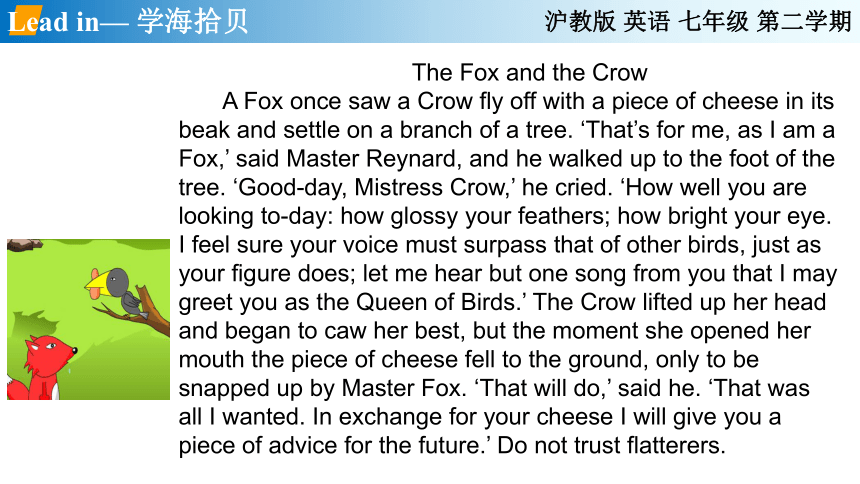
|
|
| 格式 | pptx | ||
| 文件大小 | 535.6KB | ||
| 资源类型 | 试卷 | ||
| 版本资源 | 牛津上海版(试用本) | ||
| 科目 | 英语 | ||
| 更新时间 | 2022-03-09 14:36:34 | ||
图片预览

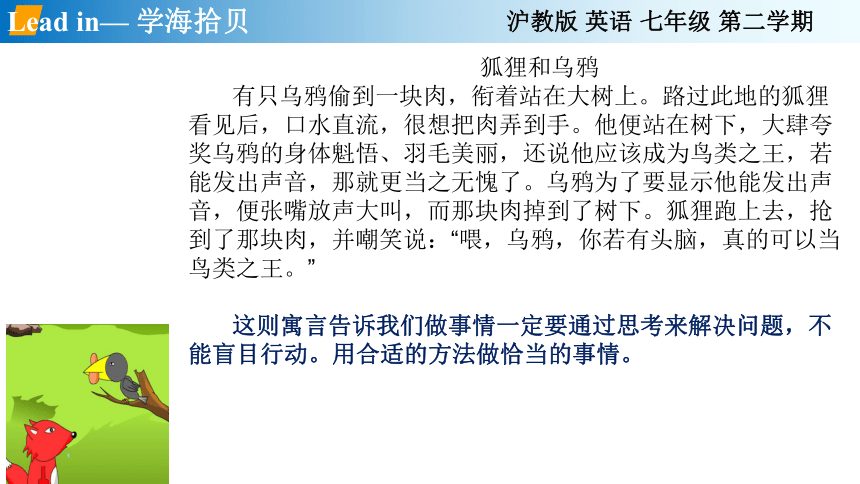
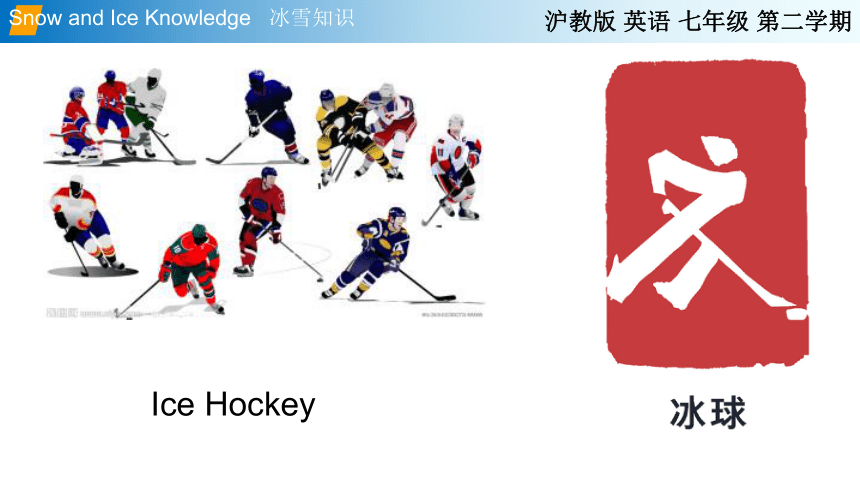
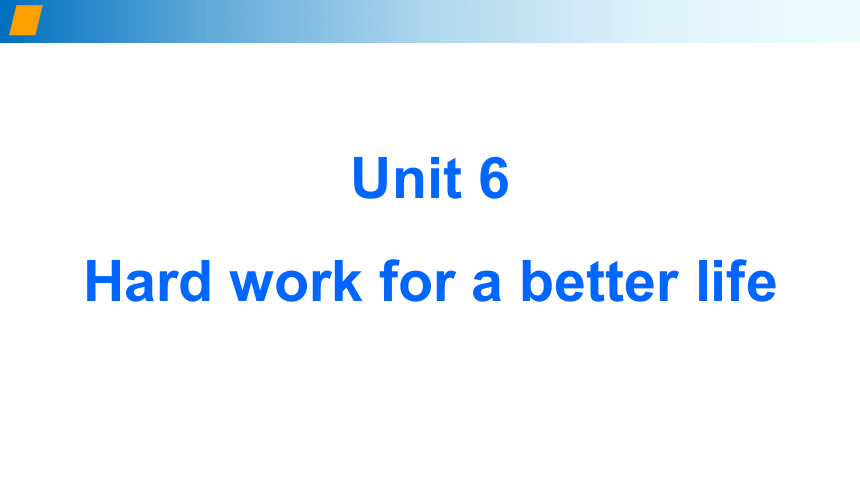
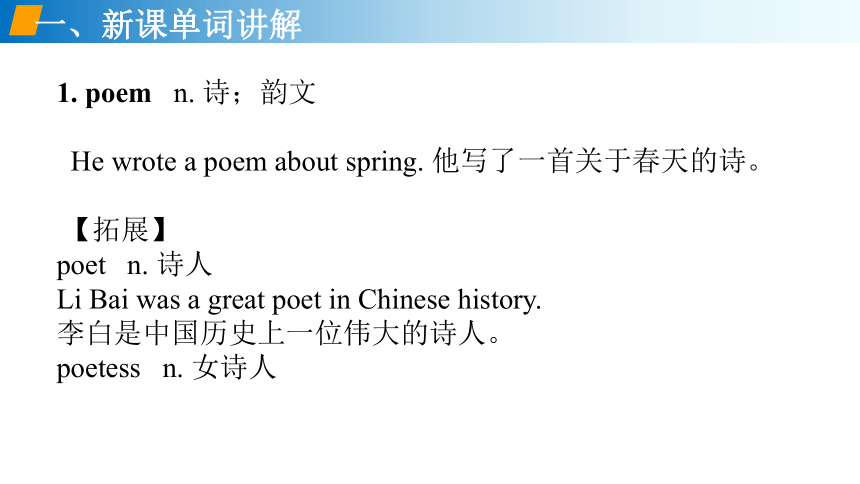

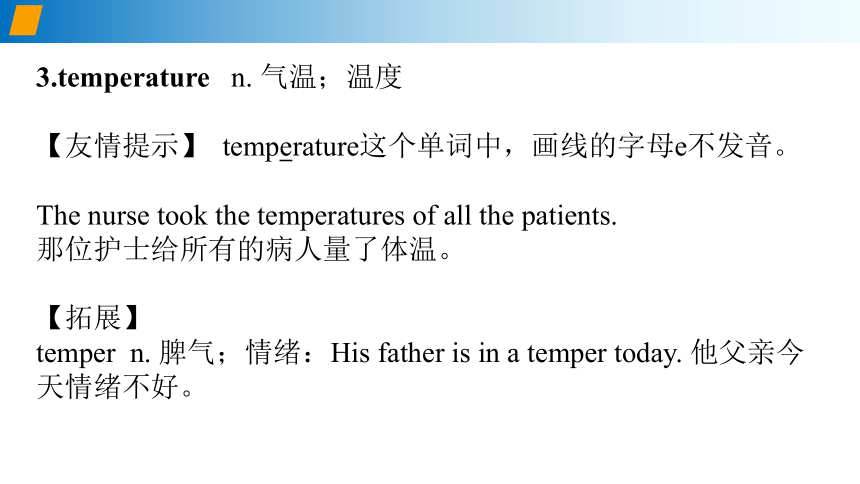
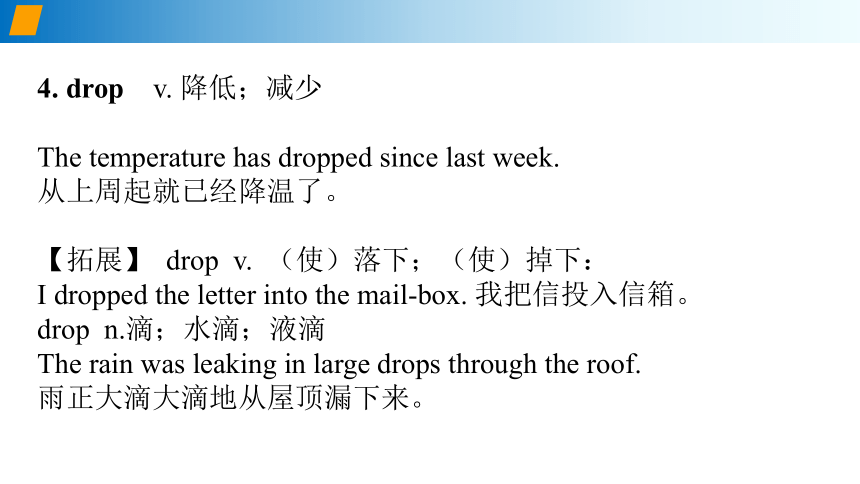
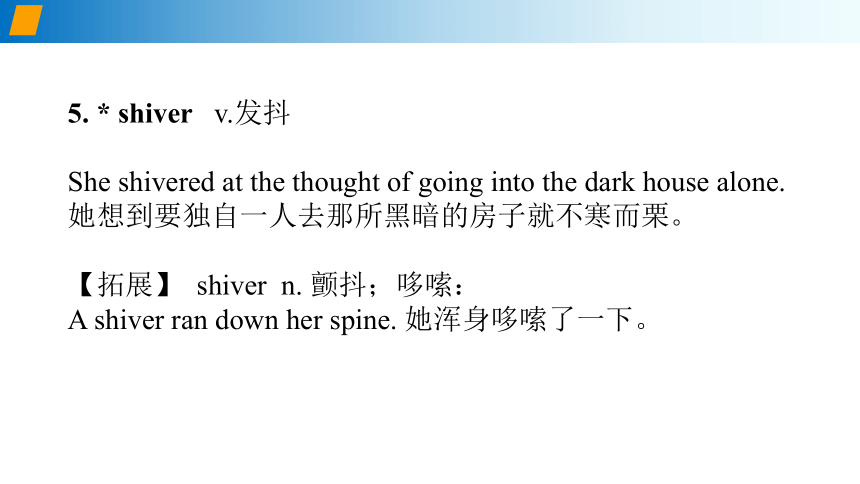
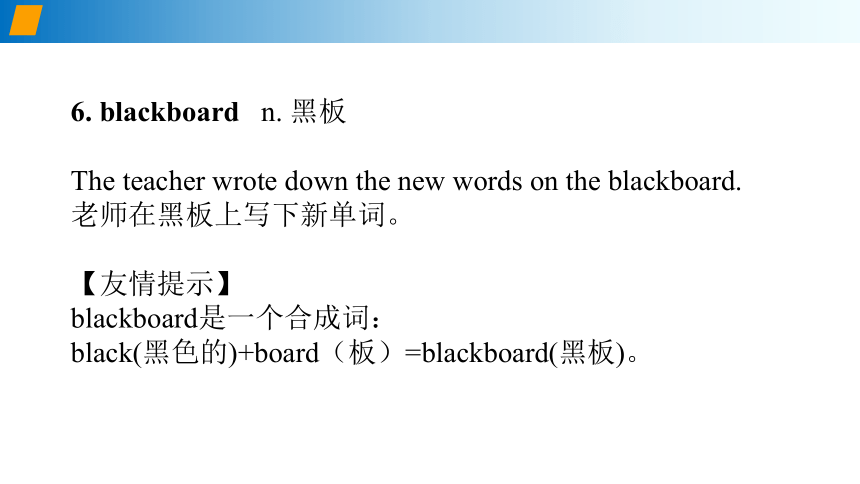
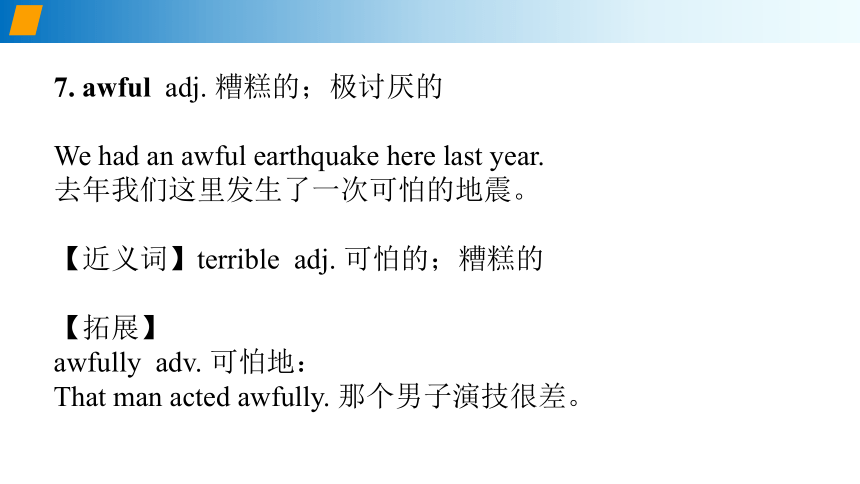
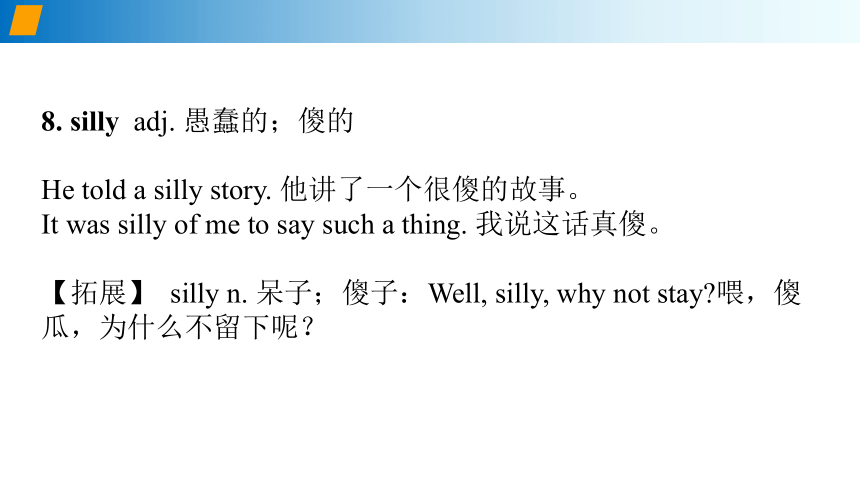
文档简介
(共30张PPT)
Lead in— 学海拾贝
The Fox and the Crow
A Fox once saw a Crow fly off with a piece of cheese in its beak and settle on a branch of a tree. ‘That’s for me, as I am a Fox,’ said Master Reynard, and he walked up to the foot of the tree. ‘Good-day, Mistress Crow,’ he cried. ‘How well you are looking to-day: how glossy your feathers; how bright your eye. I feel sure your voice must surpass that of other birds, just as your figure does; let me hear but one song from you that I may greet you as the Queen of Birds.’ The Crow lifted up her head and began to caw her best, but the moment she opened her mouth the piece of cheese fell to the ground, only to be snapped up by Master Fox. ‘That will do,’ said he. ‘That was all I wanted. In exchange for your cheese I will give you a piece of advice for the future.’ Do not trust flatterers.
沪教版 英语 七年级 第二学期
Lead in— 学海拾贝
狐狸和乌鸦
有只乌鸦偷到一块肉,衔着站在大树上。路过此地的狐狸看见后,口水直流,很想把肉弄到手。他便站在树下,大肆夸奖乌鸦的身体魁悟、羽毛美丽,还说他应该成为鸟类之王,若能发出声音,那就更当之无愧了。乌鸦为了要显示他能发出声音,便张嘴放声大叫,而那块肉掉到了树下。狐狸跑上去,抢到了那块肉,并嘲笑说:“喂,乌鸦,你若有头脑,真的可以当鸟类之王。”
这则寓言告诉我们做事情一定要通过思考来解决问题,不能盲目行动。用合适的方法做恰当的事情。
沪教版 英语 七年级 第二学期
Snow and Ice Knowledge 冰雪知识
Ice Hockey
沪教版 英语 七年级 第二学期
Unit 6
Hard work for a better life
一、新课单词讲解
1. poem n. 诗;韵文
He wrote a poem about spring. 他写了一首关于春天的诗。
【拓展】
poet n. 诗人
Li Bai was a great poet in Chinese history.
李白是中国历史上一位伟大的诗人。
poetess n. 女诗人
2. end v. 结束
They ended the party with a song.
他们以一首歌结束了聚会。
【拓展】 end n. 结束;结局:
The battle finally brought the war to an end.
这一仗使这场战争宣告结束。
at the end of在……的末端;在……的结束:
At the end of the film, the hero cried sadly.
在影片的结尾,主人公伤心地哭了。
3.temperature n. 气温;温度
【友情提示】 temperature这个单词中,画线的字母e不发音。
The nurse took the temperatures of all the patients.
那位护士给所有的病人量了体温。
【拓展】
temper n. 脾气;情绪:His father is in a temper today. 他父亲今天情绪不好。
4. drop v. 降低;减少
The temperature has dropped since last week.
从上周起就已经降温了。
【拓展】 drop v. (使)落下;(使)掉下:
I dropped the letter into the mail-box. 我把信投入信箱。
drop n.滴;水滴;液滴
The rain was leaking in large drops through the roof.
雨正大滴大滴地从屋顶漏下来。
5. * shiver v.发抖
She shivered at the thought of going into the dark house alone.
她想到要独自一人去那所黑暗的房子就不寒而栗。
【拓展】 shiver n. 颤抖;哆嗦:
A shiver ran down her spine. 她浑身哆嗦了一下。
6. blackboard n. 黑板
The teacher wrote down the new words on the blackboard.
老师在黑板上写下新单词。
【友情提示】
blackboard是一个合成词:
black(黑色的)+board(板)=blackboard(黑板)。
7. awful adj. 糟糕的;极讨厌的
We had an awful earthquake here last year.
去年我们这里发生了一次可怕的地震。
【近义词】terrible adj. 可怕的;糟糕的
【拓展】
awfully adv. 可怕地:
That man acted awfully. 那个男子演技很差。
8. silly adj. 愚蠢的;傻的
He told a silly story. 他讲了一个很傻的故事。
It was silly of me to say such a thing. 我说这话真傻。
【拓展】 silly n. 呆子;傻子:Well, silly, why not stay 喂,傻瓜,为什么不留下呢?
指点迷津: silly, stupid, foolish
(1) silly指“头脑简单;不懂事的;傻头傻脑的”。
Stop asking such silly questions!别再问这么傻的问题了!
silly有时带感彩,表示嗔怪。
You silly child. 你这个傻孩子。(此句并无太多的贬义)
(2) stupid指“智力差的;反应迟钝的”。
He is very stupid in learning Maths. 他学数学很笨。
(3) foolish指“无头脑的;缺乏常识的;缺乏判断能力的”。
It was a foolish thing to ask for the moon. 想摘月亮是一件蠢事。
概括起来,silly指“傻”,stupid指“笨”,foolish多指“愚蠢”。
9. everywhere adv. 到处;处处
Cocos are everywhere in Hainan Island. 海南岛上到处都是椰子树。
指点迷津: everywhere, anywhere
everywhere是指“所有地点;每一处”;anywhere是指“任意一个地方”。
试比较:
-Where did you visit when you were staying in that city 待在那座城市的时候,你都参观哪些地方了?
-Everywhere. 哪儿都去了。(表示任何地方)
-Where do you want to go after class 放学后你想去哪儿?
-Anywhere. 哪儿都行。(表示任意一处)
10. nothing pron. 没有什么;没有东西
There is nothing interesting in the newspaper. 报纸上没有什么有趣的新闻。
指点迷津: nothing, none, no one(nobody)
nothing只能指物,表示“没有什么(东西)”。它们不可与of短语连用,作主语时,谓语动词只能用单数形式。
Nothing is impossible. 没有什么(事情)是不可能的。
none既可指人又可指物,意为“没有任何人或物;一个人也没有”,其后可与of短语连用,作主语时,谓语动词用单数或复数均可。它通常用来强调数量之少,因而常用来回答how many或how much引导的问句。
None of these pens works/work. 这些钢笔一支都不能用。
-How many books are there in the bag 这个书包里有多少书?
-None. 一本也没有。
no one= nobody意为“没有人”,常用于指人而不能用于指物,因而常用来回答who的提问。它不能与of连用。
-Who is in the room 谁在房间里?
-No one/Nobody. 没有人。
11. disappointed adj. 失望的;沮丧的
We are disappointed that you will not be able to come. 你不能前来,我们很失望。
We were disappointed at the results. 我们对结果感到失望。
【近义词】sad adj. 沮丧的;悲伤的
【拓展】 disappoint v.使失望,使沮丧:I’m sorry to disappoint you. 我很抱歉,让你失望了。
disappointing adj. 令人失望的;令人扫兴的:
The film was built up to be a masterpiece, but I found it very disappointing. 这部影片被吹捧为杰作,可是我看了之后却觉得很失望。
12. sadly adv.伤心地
He shook his head sadly. 他伤心地摇了摇头。
【拓展】 sad adj. 悲哀的;悲伤的:
She is still very sad over the death of her aunt.
姑妈的去世至今还令她悲伤不已。
sadness n. 悲哀;悲伤;忧愁:
There was some sadness in her voice.
她的声音中带有几分伤感。
Daily expressions. 日常表达
1. We start having fun. 我们开始玩乐。
have fun是“玩得开心”的意思,其中fun作名词,表示“有趣的事;有意思的事”。
You'll sure have fun at the party tonight.
今晚的聚会上你一定会玩得很开心。
Have fun while you can. The hard times is just around the corner. 趁可以玩的时候多玩玩吧。马上就是辛苦的时候了。
2. think of意为“想起;考虑”。
What does this photograph make you think of
这张照片让你想起了什么?
指点迷津: think of, think about, think over
(1) think of和think about表示“考虑;对……有某种看法”时,可以互换。
They're thinking of/about buying a new car.
他们正在考虑买一辆新车。
What do you think of/about the TV play
你认为那部电视剧怎么样?
(2) think of意为“打算;想出;关心”时,一般不与think about互换。
Helen, are you thinking of marrying Tom 海伦,你打算嫁给汤姆吗?
Who thought of the idea 谁想出的这个主意?
Lei Feng was always thinking of others. 雷锋总是为别人着想。
(3) think about意为“思考;研究”时,一般不能和think of换用。
I often thought about what you said. 我常常回想你说过的话。
I'Il think about your suggestion, and give you an answer tomorrow. 我会考虑你的建议,明天给你答复。
(4) think over意为“仔细考虑”。
Think over, and you'll find a way. 仔细考虑一下,你就会有办法的。
We need several days to think over this matter. 我们需要几天的时间仔细考虑这件事情。
3. all the time意为“一直,总是”。
I've kept on thinking about that all the time.
我一直惦记着这件事。
【近义词】 always adv. 一直;总是
4. plenty of意为“许多;大量的”。
与a lot of、lots of等意思相同,用于修饰可数或不可数名词。
There's plenty of room for everyone inside.
里面有的是地方,大家都可以进来。(修饰不可数名词room)
If a lawyer has plenty of clients, he will become rich. 一名律师如果有许多诉讼委托人,他就会发财。(修饰可数名词clients)
5. at last意为‘‘终于;最终”。
He finished his paper at last. 他终于完成了论文。
【近义词】 finally adv.最终;最后 in the end最后;终于
6. come out of是“从……出来”的意思。其中介词短语out“表示“出来”。
I saw him come out of the supermarket with a lady yesterday. Maybe it was his old sister.
昨天我看到他和一位女土从超市里出来。可能那就是他姐姐。
【友情提示】 介词短语out of表示的意思很多,其用法也颇为复杂,现归纳如下:
(1)表示地点(从里向外):
Fish can not live out of water. 离开了水,鱼就不能活。
(2)表示动作或运动的方向:
They walked out of the supermarket. 他们走出了超市。
(3)表示部分关系:
This will happen in nine cases out of ten. 这种情况十之八九会发生。
(4)表示“在……范围以外;越出……界限”:
The ship is out of sight. 船已驶出了视野范围。
(5)表示“出于……动机;由于……原因”:
The traffic accident was out of carelessness in driving. 这起交通事故是由于粗心驾驶所致。
(6)表示竭尽或缺乏:
We are out of tea. 我们的茶叶用完了。
(7)表示材料或来源:
This paragraph is out of Marx's works. 这一段引自马克思著作。
(8)与某些动词连用,表示“放弃;丧失”:
He talked his wife out of buying a new bicycle. 他说服妻子不买新自行车了。
另外,out of与其他词可以构成许多实用、常见的固定词组,这些词组有:
out of action (失去作用;停止运动),out of breath(上气不接下气),out of control(失去控制),out of date(过时),out of doubt(确定无疑),out of fashion(过时了),out of kindness(出于好意),out of order(不整齐;次序颠倒),out of one’s power(力所不及),out of place(不适当,不相称),out of question(毫无疑问),out of the question(不可能;成问题),out of shape(变形),out of work(失业)等。
I. Fill in the blanks with the words in their proper forms.
1. In autumn, some become brown, red or yellow. (leaf)
2. Let's start . (run)
3. They will just go to in winter. (asleep)
4. My parents work hard for a life. (good)
5. It's too hot. Let's go in the pool. (swim)
6. It's today. Please put on your cap. (sun)
7. The sun gives us light and . (hot)
8. On a day, we can fly kites in the park. (wind)
9. Look, the birds are making their in the tree. (nest)
10.This is my time to visit China. (two)
【随堂小练】
【Keys】
I . 1. leaves 2. running 3. sleep 4. better 5. swimming 6. sunny 7. heat 8. windy 9. nests 10. second
Ⅱ. Choose the right word to complete the sentence.
1. We start_____________( having/have)fun.
2. The temperature is . (dropping/dripping)
3. Look at the clouds. There is going to (be/have)a storm.
4. Flowers start growing in . (spring/summer)
5. The holidays are ending. is here. (Winter/Autumn)
II. 1. having 2. dropping 3. be 4. spring 5. Autumn
愿君皆有所获,皆有所得
Lead in— 学海拾贝
The Fox and the Crow
A Fox once saw a Crow fly off with a piece of cheese in its beak and settle on a branch of a tree. ‘That’s for me, as I am a Fox,’ said Master Reynard, and he walked up to the foot of the tree. ‘Good-day, Mistress Crow,’ he cried. ‘How well you are looking to-day: how glossy your feathers; how bright your eye. I feel sure your voice must surpass that of other birds, just as your figure does; let me hear but one song from you that I may greet you as the Queen of Birds.’ The Crow lifted up her head and began to caw her best, but the moment she opened her mouth the piece of cheese fell to the ground, only to be snapped up by Master Fox. ‘That will do,’ said he. ‘That was all I wanted. In exchange for your cheese I will give you a piece of advice for the future.’ Do not trust flatterers.
沪教版 英语 七年级 第二学期
Lead in— 学海拾贝
狐狸和乌鸦
有只乌鸦偷到一块肉,衔着站在大树上。路过此地的狐狸看见后,口水直流,很想把肉弄到手。他便站在树下,大肆夸奖乌鸦的身体魁悟、羽毛美丽,还说他应该成为鸟类之王,若能发出声音,那就更当之无愧了。乌鸦为了要显示他能发出声音,便张嘴放声大叫,而那块肉掉到了树下。狐狸跑上去,抢到了那块肉,并嘲笑说:“喂,乌鸦,你若有头脑,真的可以当鸟类之王。”
这则寓言告诉我们做事情一定要通过思考来解决问题,不能盲目行动。用合适的方法做恰当的事情。
沪教版 英语 七年级 第二学期
Snow and Ice Knowledge 冰雪知识
Ice Hockey
沪教版 英语 七年级 第二学期
Unit 6
Hard work for a better life
一、新课单词讲解
1. poem n. 诗;韵文
He wrote a poem about spring. 他写了一首关于春天的诗。
【拓展】
poet n. 诗人
Li Bai was a great poet in Chinese history.
李白是中国历史上一位伟大的诗人。
poetess n. 女诗人
2. end v. 结束
They ended the party with a song.
他们以一首歌结束了聚会。
【拓展】 end n. 结束;结局:
The battle finally brought the war to an end.
这一仗使这场战争宣告结束。
at the end of在……的末端;在……的结束:
At the end of the film, the hero cried sadly.
在影片的结尾,主人公伤心地哭了。
3.temperature n. 气温;温度
【友情提示】 temperature这个单词中,画线的字母e不发音。
The nurse took the temperatures of all the patients.
那位护士给所有的病人量了体温。
【拓展】
temper n. 脾气;情绪:His father is in a temper today. 他父亲今天情绪不好。
4. drop v. 降低;减少
The temperature has dropped since last week.
从上周起就已经降温了。
【拓展】 drop v. (使)落下;(使)掉下:
I dropped the letter into the mail-box. 我把信投入信箱。
drop n.滴;水滴;液滴
The rain was leaking in large drops through the roof.
雨正大滴大滴地从屋顶漏下来。
5. * shiver v.发抖
She shivered at the thought of going into the dark house alone.
她想到要独自一人去那所黑暗的房子就不寒而栗。
【拓展】 shiver n. 颤抖;哆嗦:
A shiver ran down her spine. 她浑身哆嗦了一下。
6. blackboard n. 黑板
The teacher wrote down the new words on the blackboard.
老师在黑板上写下新单词。
【友情提示】
blackboard是一个合成词:
black(黑色的)+board(板)=blackboard(黑板)。
7. awful adj. 糟糕的;极讨厌的
We had an awful earthquake here last year.
去年我们这里发生了一次可怕的地震。
【近义词】terrible adj. 可怕的;糟糕的
【拓展】
awfully adv. 可怕地:
That man acted awfully. 那个男子演技很差。
8. silly adj. 愚蠢的;傻的
He told a silly story. 他讲了一个很傻的故事。
It was silly of me to say such a thing. 我说这话真傻。
【拓展】 silly n. 呆子;傻子:Well, silly, why not stay 喂,傻瓜,为什么不留下呢?
指点迷津: silly, stupid, foolish
(1) silly指“头脑简单;不懂事的;傻头傻脑的”。
Stop asking such silly questions!别再问这么傻的问题了!
silly有时带感彩,表示嗔怪。
You silly child. 你这个傻孩子。(此句并无太多的贬义)
(2) stupid指“智力差的;反应迟钝的”。
He is very stupid in learning Maths. 他学数学很笨。
(3) foolish指“无头脑的;缺乏常识的;缺乏判断能力的”。
It was a foolish thing to ask for the moon. 想摘月亮是一件蠢事。
概括起来,silly指“傻”,stupid指“笨”,foolish多指“愚蠢”。
9. everywhere adv. 到处;处处
Cocos are everywhere in Hainan Island. 海南岛上到处都是椰子树。
指点迷津: everywhere, anywhere
everywhere是指“所有地点;每一处”;anywhere是指“任意一个地方”。
试比较:
-Where did you visit when you were staying in that city 待在那座城市的时候,你都参观哪些地方了?
-Everywhere. 哪儿都去了。(表示任何地方)
-Where do you want to go after class 放学后你想去哪儿?
-Anywhere. 哪儿都行。(表示任意一处)
10. nothing pron. 没有什么;没有东西
There is nothing interesting in the newspaper. 报纸上没有什么有趣的新闻。
指点迷津: nothing, none, no one(nobody)
nothing只能指物,表示“没有什么(东西)”。它们不可与of短语连用,作主语时,谓语动词只能用单数形式。
Nothing is impossible. 没有什么(事情)是不可能的。
none既可指人又可指物,意为“没有任何人或物;一个人也没有”,其后可与of短语连用,作主语时,谓语动词用单数或复数均可。它通常用来强调数量之少,因而常用来回答how many或how much引导的问句。
None of these pens works/work. 这些钢笔一支都不能用。
-How many books are there in the bag 这个书包里有多少书?
-None. 一本也没有。
no one= nobody意为“没有人”,常用于指人而不能用于指物,因而常用来回答who的提问。它不能与of连用。
-Who is in the room 谁在房间里?
-No one/Nobody. 没有人。
11. disappointed adj. 失望的;沮丧的
We are disappointed that you will not be able to come. 你不能前来,我们很失望。
We were disappointed at the results. 我们对结果感到失望。
【近义词】sad adj. 沮丧的;悲伤的
【拓展】 disappoint v.使失望,使沮丧:I’m sorry to disappoint you. 我很抱歉,让你失望了。
disappointing adj. 令人失望的;令人扫兴的:
The film was built up to be a masterpiece, but I found it very disappointing. 这部影片被吹捧为杰作,可是我看了之后却觉得很失望。
12. sadly adv.伤心地
He shook his head sadly. 他伤心地摇了摇头。
【拓展】 sad adj. 悲哀的;悲伤的:
She is still very sad over the death of her aunt.
姑妈的去世至今还令她悲伤不已。
sadness n. 悲哀;悲伤;忧愁:
There was some sadness in her voice.
她的声音中带有几分伤感。
Daily expressions. 日常表达
1. We start having fun. 我们开始玩乐。
have fun是“玩得开心”的意思,其中fun作名词,表示“有趣的事;有意思的事”。
You'll sure have fun at the party tonight.
今晚的聚会上你一定会玩得很开心。
Have fun while you can. The hard times is just around the corner. 趁可以玩的时候多玩玩吧。马上就是辛苦的时候了。
2. think of意为“想起;考虑”。
What does this photograph make you think of
这张照片让你想起了什么?
指点迷津: think of, think about, think over
(1) think of和think about表示“考虑;对……有某种看法”时,可以互换。
They're thinking of/about buying a new car.
他们正在考虑买一辆新车。
What do you think of/about the TV play
你认为那部电视剧怎么样?
(2) think of意为“打算;想出;关心”时,一般不与think about互换。
Helen, are you thinking of marrying Tom 海伦,你打算嫁给汤姆吗?
Who thought of the idea 谁想出的这个主意?
Lei Feng was always thinking of others. 雷锋总是为别人着想。
(3) think about意为“思考;研究”时,一般不能和think of换用。
I often thought about what you said. 我常常回想你说过的话。
I'Il think about your suggestion, and give you an answer tomorrow. 我会考虑你的建议,明天给你答复。
(4) think over意为“仔细考虑”。
Think over, and you'll find a way. 仔细考虑一下,你就会有办法的。
We need several days to think over this matter. 我们需要几天的时间仔细考虑这件事情。
3. all the time意为“一直,总是”。
I've kept on thinking about that all the time.
我一直惦记着这件事。
【近义词】 always adv. 一直;总是
4. plenty of意为“许多;大量的”。
与a lot of、lots of等意思相同,用于修饰可数或不可数名词。
There's plenty of room for everyone inside.
里面有的是地方,大家都可以进来。(修饰不可数名词room)
If a lawyer has plenty of clients, he will become rich. 一名律师如果有许多诉讼委托人,他就会发财。(修饰可数名词clients)
5. at last意为‘‘终于;最终”。
He finished his paper at last. 他终于完成了论文。
【近义词】 finally adv.最终;最后 in the end最后;终于
6. come out of是“从……出来”的意思。其中介词短语out“表示“出来”。
I saw him come out of the supermarket with a lady yesterday. Maybe it was his old sister.
昨天我看到他和一位女土从超市里出来。可能那就是他姐姐。
【友情提示】 介词短语out of表示的意思很多,其用法也颇为复杂,现归纳如下:
(1)表示地点(从里向外):
Fish can not live out of water. 离开了水,鱼就不能活。
(2)表示动作或运动的方向:
They walked out of the supermarket. 他们走出了超市。
(3)表示部分关系:
This will happen in nine cases out of ten. 这种情况十之八九会发生。
(4)表示“在……范围以外;越出……界限”:
The ship is out of sight. 船已驶出了视野范围。
(5)表示“出于……动机;由于……原因”:
The traffic accident was out of carelessness in driving. 这起交通事故是由于粗心驾驶所致。
(6)表示竭尽或缺乏:
We are out of tea. 我们的茶叶用完了。
(7)表示材料或来源:
This paragraph is out of Marx's works. 这一段引自马克思著作。
(8)与某些动词连用,表示“放弃;丧失”:
He talked his wife out of buying a new bicycle. 他说服妻子不买新自行车了。
另外,out of与其他词可以构成许多实用、常见的固定词组,这些词组有:
out of action (失去作用;停止运动),out of breath(上气不接下气),out of control(失去控制),out of date(过时),out of doubt(确定无疑),out of fashion(过时了),out of kindness(出于好意),out of order(不整齐;次序颠倒),out of one’s power(力所不及),out of place(不适当,不相称),out of question(毫无疑问),out of the question(不可能;成问题),out of shape(变形),out of work(失业)等。
I. Fill in the blanks with the words in their proper forms.
1. In autumn, some become brown, red or yellow. (leaf)
2. Let's start . (run)
3. They will just go to in winter. (asleep)
4. My parents work hard for a life. (good)
5. It's too hot. Let's go in the pool. (swim)
6. It's today. Please put on your cap. (sun)
7. The sun gives us light and . (hot)
8. On a day, we can fly kites in the park. (wind)
9. Look, the birds are making their in the tree. (nest)
10.This is my time to visit China. (two)
【随堂小练】
【Keys】
I . 1. leaves 2. running 3. sleep 4. better 5. swimming 6. sunny 7. heat 8. windy 9. nests 10. second
Ⅱ. Choose the right word to complete the sentence.
1. We start_____________( having/have)fun.
2. The temperature is . (dropping/dripping)
3. Look at the clouds. There is going to (be/have)a storm.
4. Flowers start growing in . (spring/summer)
5. The holidays are ending. is here. (Winter/Autumn)
II. 1. having 2. dropping 3. be 4. spring 5. Autumn
愿君皆有所获,皆有所得
同课章节目录
- Module 1 Garden City and its neighbours
- Unit 1 Writing a travel guide
- Unit 2 Going to see a film
- Unit 3 A visit to Garden City
- Module 2 Better future
- Unit 4 Let's go shopping
- Unit 5 What can we learn from others?
- Unit 6 Hard work for a better life
- Unit 7 in the future
- Module 3 The natural elements
- Unit 8 A more enjoyable school life
- Unit 9 The wind is blowing
- Unit 10 Water Festival
- Unit 11 Electricity
